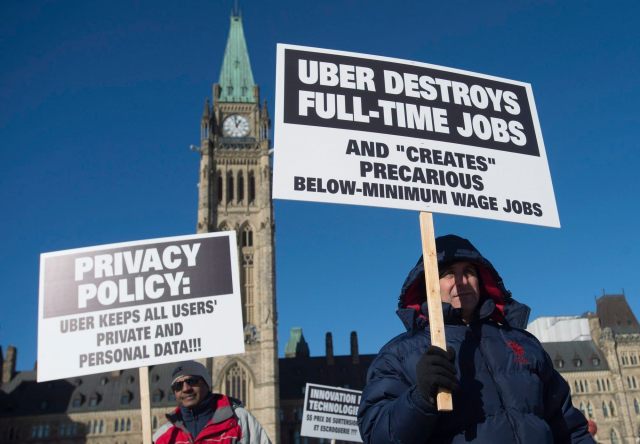Taxi drivers protest against Uber in Canada. – Credit: Adrian Wyld/The Canadian Press/PA Images
“Contorted, indecipherable and window-dressing”, that’s how Judge Joanna Wade described delivery service CitySprint’s contractual arrangements with its couriers.[1. .‘Courier wins holiday pay in key tribunal ruling on gig economy’, The Guardian, 6 January 2017] The case, in which a London employment tribunal found that CitySprint should have treated a cycle courier as a worker rather than an independent contractor, is one of a flurry being brought against gig economy platforms.
Uber never seems to be out of the courts. In America, eleven cases are currently sitting with the 9th US Circuit Court of Appeals. In the UK, the ride-hailing company looks set for a trip to the Supreme Court in its fight against a tribunal ruling that its drivers should be classified as workers.
The plight of gig workers has become the cause celebre of workers’ rights. Greedy gig platforms are condemned as the modern-day equivalent of the exploitative factory owners of the industrial revolution. Sick pay? The minimum wage? Bargaining rights? Not for the ‘gigger’. Instead there’s flexibility and control – which, the companies argue – is why people sign up.
The CitySprint case was brought by a single employee, but as with those against Uber, the implications are sector-wide. As this model matures, the relevant companies will need to make changes. The greater concern should be the spread of gig-style labour models to non-gig work – and we’re already seeing that happen.

The gig economy works for the many
Companies arguing that workers want flexibility are not wrong:
- Detailed research by the RSA think tank found that more than half of UK gig workers viewed the work positively, citing advantages like flexibility or decent pay; and 63% of current workers agreed that it allowed them to have more “control and freedom over when they work”.[2. Brhmie Balaram, Josie Warden and Fabian Wallace-Stephens, ‘Good Gigs. A fairer future for the UK’s gig economy’, RSA, April 2017]
- A McKinsey report looking at America and Europe found that the majority of gig workers are independent contractors by choice.[3. .‘Independent work. Choice, necessity and the gig economy’, McKinsey Global Institute, October 2016] They also found that for every worker whose primary earnings are from contracting, but would prefer a traditional job, more than two traditional workers would like to become independent contractors.
The controversy engulfing the gig model risks undermining what makes gig work so attractive to so many.
And it risks ignoring the broader benefits that disruptive app-based companies such as Uber, TaskRabbit and Handy are delivering – making services cheaper and more accessible for consumers; directly connecting service providers with their market, in real time; and lowering the barriers to entry for people seeking employment, particularly for young people.
The benefits of removing the middleman shouldn’t be underestimated. There are now gig platforms for social care workers, supply teachers and health workers, cutting out the agency fees and paying higher wages. These are people who are better off because of the advent of gig platforms.
This is not to say that greater protections for workers are unwarranted. While a majority of gig workers are actively choosing that model of work – often supplementing other sources of income – a good chunk, estimated at just over a quarter in the UK and US, do so out of necessity. That is, they can’t find sufficient ‘regularised’ work elsewhere.
And while many gig platforms have developed in sectors that were already heavily skewed towards self-employment (something critics conveniently forget), that doesn’t mean action shouldn’t be taken to raise standards – particularly when more and more people are working in this way. Plus, strictly speaking, there is a difference between being self-employed, running your own enterprise, and being an independent contractor working for a single company.
A review of “good work”, commissioned by the UK government and triggered by concerns about working conditions in the burgeoning gig economy, argues the onus should be on the companies:[4. .‘Good work: the Taylor review of modern working practices’, 11 July 2017]
“The best way to achieve better work is not national regulation but responsible corporate governance, good management and strong employment relations within the organisation, which is why it is important that companies are seen to take good work seriously and are open about their practices and that all workers are able to be engaged and heard.”
The RSA recommend a ‘Charter for Good Work in the Gig Economy’, a collaboration between government, companies and representative bodies to agree a set of standards that value workers.[5. Brhmie Balaram, Josie Warden and Fabian Wallace-Stephens, ‘Good Gigs. A fairer future for the UK’s gig economy’, RSA, April 2017] As the gig economy grows, putting more traditional employee-based firms out of business, and disrupting new industries, it’s right that businesses take seriously the economic and social security of their workers – contractors or not. A Charter would be a good place to start.

The greatest challenge, however, is the threat of the gig model being bastardised by unscrupulous businesses looking to increase profits at the expense of their workers. As a joint report by two UK parliamentary committees this week put it: “willingness to exploit workers should not be a competitive advantage”.[6. .A framework for modern employment, Second Report of the Work and Pensions Committee and First Report of the Business, Energy and Industrial Strategy Committee of Session 2017–19, 15 November 2017]
It’s called the gig economy for a reason – workers get paid for discrete ‘gigs’, like hanging a picture, developing an app, cleaning a flat; and they perform multiple gigs for multiple clients. That’s why it’s a form of self-employment. And why self-employment and employment are treated differently. Blurring those lines to cut costs is a cynical move that makes a mockery of the age-old ‘social contract’ between business, workers and the state.
We can already see it happening.
Take budget airline Ryanair for example, recently in the news for cancelling thousands of flights. Ryanair uses ‘self-employed’ pilots, thereby enabling them to avoid employee-related taxes and benefits.

Writing in The New York Times Liz Alderman and Amie Tsang report on conditions at Ryanair similar to those experienced by gig workers at companies such as Uber and Deliveroo: pilots and crew say they only get paid for flight time, not preparation; their hours are not guaranteed; and they have to cover their own, unavoidable, expenses such as hotels and transport, even their own uniforms.[7. Liz Alderman and Amie Tsang, ‘Jet Pilot Might Not Seem Like a ‘Gig,’ but at Ryanair, It Is’, The New York Times, 16 November 2017]
Unlike genuine gig workers, however, Ryanair pilots are not undertaking ‘gigs’. They work for one company, on that company’s schedule – how is that different from an employee? If the trade made by self-employed people is flexibility and control in exchange for fewer benefits, Ryanair pilots are getting all of the downside and none of the upside.
What happens when Ryanair is no longer an outlier but the norm? That’s not so difficult to imagine. The rise of the actual gig economy has been swift, and we didn’t see it coming.
Management consultancy firms could decide to make their consultants contractors, and their HQs the ‘platform’ for allocating labour. Major retailers could start allocating shifts as ‘gig’ work – the next step from zero hour contracts? A major hotel chain could start getting housekeeping or reception services on a flexible, as-needed basis. Or a factory starts contracting assembly line workers according to the ebb and flow of orders.
That’s a level of disruption no economy or society is prepared for, and one that requires an entirely new approach to tax and social security.
The two UK parliamentary committees warning of the risks of exploitative behaviour have gone so far as to draft legislation which, if enacted, would introduce “a new presumption of ‘worker by default’”, that “would require companies to provide basic safety net standards of rights and benefits to their workers—or prove that their working practices are genuinely reflecting of self-employment.”[8. .‘Committees publish bill to end exploitation’, Work and Pensions and Business, Energy and Industrial Strategy Committees, 20 November 2017]
Such a measure will undoubtedly raise the heckles of businesses and their trade body cheerleaders. They will call it heavy-handed; burdensome regulation that stifles innovation. But if employers continue pushing at the limits of what society deems fair and decent, if they rip up the social contract, then they shouldn’t be surprised when society pushes back.









Join the discussion
Join like minded readers that support our journalism by becoming a paid subscriber
To join the discussion in the comments, become a paid subscriber.
Join like minded readers that support our journalism, read unlimited articles and enjoy other subscriber-only benefits.
Subscribe